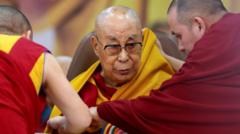Beginning Wednesday, the historic conclave in Vatican City will witness cardinals from across the globe convening to elect the next pope after the passing of Pope Francis last month at the age of 88. A total of 133 cardinals will enter the Sistine Chapel, locking themselves away until one candidate secures a two-thirds majority.
The Intriguing Race to Choose a New Pope

The Intriguing Race to Choose a New Pope
As the conclave commences, 133 cardinals engage in a complex and secretive election process to select the next pope following the death of Pope Francis.
According to Jason Horowitz, the Rome bureau chief for The New York Times, the process is marked by intense political maneuvering. "It has pure politics, with backstabbing, and throwing people under the bus, and putting up fake candidates," he remarked, citing the drama that accompanies papal elections.
During the conclave, cardinals will cast votes in secret ballots, with results indicated by the appearance of black or white smoke from a chimney atop the chapel. Black smoke signifies no consensus, while white smoke signals the election of a new pope. This process can stretch from just a few hours to almost three years, a record established in the 13th century.
Once a new pope has been confirmed and identified through the white smoke signal, The Times is prepared to share the news and detailed analysis about his selection almost immediately. "At least, that’s the hope," Horowitz noted, acknowledging the unpredictability of potential dark-horse candidates that could emerge during the voting process.
The world is poised to witness this sacred and secretive event, which not only affects the Roman Catholic Church but also resonates with millions of followers globally.
During the conclave, cardinals will cast votes in secret ballots, with results indicated by the appearance of black or white smoke from a chimney atop the chapel. Black smoke signifies no consensus, while white smoke signals the election of a new pope. This process can stretch from just a few hours to almost three years, a record established in the 13th century.
Once a new pope has been confirmed and identified through the white smoke signal, The Times is prepared to share the news and detailed analysis about his selection almost immediately. "At least, that’s the hope," Horowitz noted, acknowledging the unpredictability of potential dark-horse candidates that could emerge during the voting process.
The world is poised to witness this sacred and secretive event, which not only affects the Roman Catholic Church but also resonates with millions of followers globally.





















